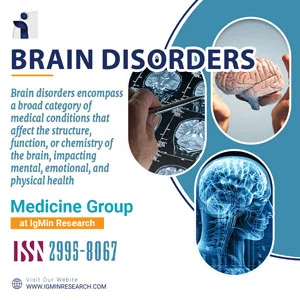About
Brain Disorders encompass a wide range of conditions that affect the structure, function, and overall health of the brain. This dynamic field of study integrates insights from neuroscience, genetics, psychiatry, and molecular biology to unravel the complexities of brain dysfunctions such as Alzheimer's disease, Parkinson's disease, epilepsy, and traumatic brain injury. Researchers in this area focus on understanding the underlying causes, diagnostic biomarkers, and therapeutic interventions to improve outcomes for individuals affected by brain disorders. The study of brain disorders is crucial for advancing knowledge about cognitive decline, mental health, and neurological impairments.
By leveraging cutting-edge technologies, such as neuroimaging, genomics, and computational models, researchers are gaining new insights into the mechanisms that drive these conditions. This multidisciplinary approach is essential for developing innovative treatments, preventive strategies, and personalized care for patients suffering from brain disorders. The ultimate goal is to enhance brain health, improve quality of life, and reduce the global burden of neurological diseases.

Why publish with us?
Global Visibility – Indexed in major databases
Fast Peer Review – Decision within 14–21 days
Open Access – Maximize readership and citation
Multidisciplinary Scope – Biology, Medicine and Engineering
Editorial Board Excellence – Global experts involved
University Library Indexing – Via OCLC
Permanent Archiving – CrossRef DOI
APC – Affordable APCs with discounts
Citation – High Citation Potential
Which articles are now trending?
Research Articles
- Influence of Polycarboxylate Superplasticizer on the Calorimetric and Physicomechanical Properties of Mortar
- Investigation of Lateral Vibrations in Turbine-generator Unit 5 of the Inga 2 Hydroelectric Power Plant
- Utilising Phytoremediation in Green Technologies: Exploring Natural Means of Environmental Clean-up
- Study of the Histological Features of the Stroma of High-Grade Gliomas Depending on the Status of the Mutation in the IDH1 Gene
- Assessment of Thermal Uniformity of Heating Plates Using a Thermal Imaging Camera
- DNA Genetics and UHPLC-Q-TOF-MS Analysis of Phytochemicals for Asparagus racemosus Roots
Advertisement











